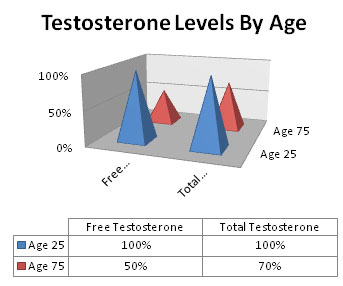What Are Free Testosterone Levels?

Most testosterone is connected to two types of proteins in the blood. One protein is called sex hormone binding globulin (SHBG). When the hormone is unattached altogether, this is called free testosterone. When it is attached, it is called total testosterone. Free testosterone depletes faster than total testosterone.
Free testosterone levels are the ranges of this unbound hormone that a person has in their system. They should be within normal range (as defined by the clinic the patient is using) in order to maintain optimal health without experiencing the negative symptoms of aging.
This hormone is very important for both men and women to have, with women needing less in their bloodstream than men need. Women produce it in their ovaries and men produce it in their testes.
Free testosterone is when the hormone is not bound to any proteins in the blood. It decreases faster than total testosterone; by about 50% in healthy men from the ages of 25 to 75.
When free testosterone levels are too low, this can create problems for a person, especially with their sexual traits. They may lose their sexual libido and desire for intimacy, develop erectile dysfunction (for men) or vaginal dryness (for women) or have unmanageable hot flashes and night sweats.
Low free testosterone levels can also create the following problems:
| Low energy | Minimal endurance | Muscle loss |
| No stamina | Weight gain | High cholesterol levels |
| High triglyceride levels | Wrinkles | Haggard looking or sagging skin |
| Heart issues such as stroke or heart attack |
Mood swings | Balding |
| Diabetes | Emotional instability | Hair thinning |
| Loss of bone density | Forgetfulness | Nails that do not grow |
| Risk for osteoporosis | Memory loss; | Trouble with healing |
| Sexual problems | Lack of ability to focus or to concentrate |
Slow restoration of cells and tissues in the body |
| Depression | A weak immune system | Inability to recovery quickly from workouts |
| Anxiety | Slow metabolism | |
| Irritability | Shrinking organs |
In order to find out if low free testosterone levels are causing your issues, you must get blood tested. HT Medical Center has professionals who will lead you through the entire protocol to get tested and to begin safe and effective testosterone replacement therapy (TRT) if you qualify.
How To Check Your Free Testosterone Levels
HT Medical Center clinical advisors set up appointments for our clients for the correct blood testing to be done in a local TRT clinic in their city. This is the only way to correctly check your free testosterone levels; through blood work. Then a physical exam must be completed and a medical history must be shared to check the patient’s health overall.
Testing will only be done with patients who are over 30 and who are not professional athletes. They must be experiencing symptoms of low T and not want TRT to gain muscle, improve their athletic performance or to improve their sexual ability and performance. They must be otherwise healthy adults in general.
Clinics will each have their own average reference ranges for testosterone levels. They will only vary slightly, but there is no one range that is considered the “only” range. Here is what HT Medical Center refers to when they are determining a male client’s average levels of free testosterone:
| Age of Male | Average Levels of Free Testosterone in Men |
| 30 to 40 | 10.3 pg/mL |
| 40 to 50 | 9.1 pg/mL |
| 50 to 60 | 8.3 pg/mL |
| Over 60 | 6.9 pg/mL |
Most sources agree that average free testosterone levels for women should fall between 0.1 – 6.4 pg/mL. Both men and women need this hormone for good health and well being.
For men, free testosterone levels are as follows:
High free testosterone levels:
- 30 to 40 years old: > 10.3 pg/mL
- 40 to 50 years old: > 9.1 pg/mL
- 50 to 60 years old: > 8.3 pg/mL
- Over 60 years old: > 6.9 pg/mL
Low free testosterone levels:
- 30 to 40 years old: < 10.3 pg/mL
- 40 to 50 years old: < 9.1 pg/mL
- 50 to 60 years old: < 8.3 pg/mL
- Over 60 years old: < 6.9 pg/mL
Normal free testosterone levels:
- 30 to 40 years old: 10.3 pg/mL
- 40 to 50 years old: 9.1 pg/mL
- 50 to 60 years old: 8.3 pg/mL
- Over 60 years old: 6.9 pg/mL
Here is a chart that shows how high, low and normal should look in women and men over 30.

Contact HT Medical Center to check your free testosterone levels.















